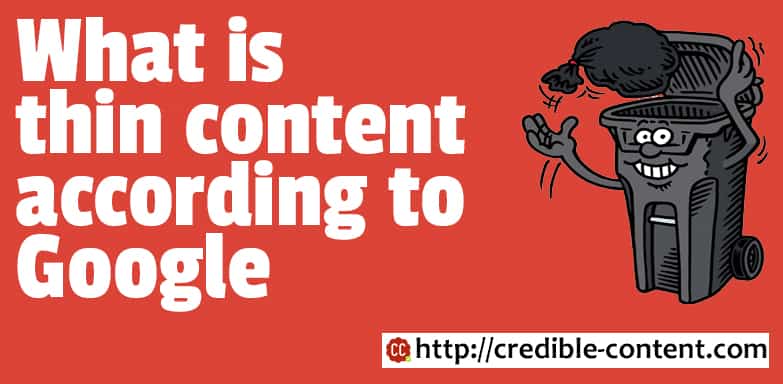 Thin content according to Google is little or no original content. Google wants to provide information-rich search results to its users so obviously it doesn’t like it when valueless content appears at the top of the search results. This is why when Google considers your content as “thin content”, it penalizes your website and consequently, this harms your SEO.
Thin content according to Google is little or no original content. Google wants to provide information-rich search results to its users so obviously it doesn’t like it when valueless content appears at the top of the search results. This is why when Google considers your content as “thin content”, it penalizes your website and consequently, this harms your SEO.
What sort of content is thin content according to Google?
Many web owners start generating meaningless content hoping that this would improve their search engine rankings. This can be auto generated content. It can be doorway pages. It can be scrapped content (a web script visit pages and scraps contents of them). It can be duplicate content – same content but different headlines.
The content that is not generated by a human after due thought is basically thin content. Google has advanced algorithms to make out if you are generating thin content to improve your SEO.
It is not entirely true though. Even human-generated content can be thin content. For example, you have been creating webpages and blog posts that are just 200-300 words. This can be termed as thin content. In itself it cannot be harmful for your SEO but what would Google prefer? 200-300 words on a topic by you or 1500 words on the same topic by someone else?
This is what Google has to say about thin content:
Some webmasters attempt to improve their pages’ ranking and attract visitors by creating pages with many words but little or no authentic content. Google will take action against domains that try to rank more highly by just showing scraped or other cookie-cutter pages that don’t add substantial value to users.
Here is a video where Matt Cutts describes thin content
Although thin content was in vogue in the early 2000’s and mid-2000’s, some ill-informed website owners and SEO experts still think that quickly generating lots of content can get them good search engine rankings.
The problem may lie in the fact that by fluke sometimes the websites begin to get good rankings but these rankings don’t last. Sooner or later these people get caught but before they get caught, there is so much noise about their fete that many more people get misguided.
The story has it that Google Panda was released precisely to tackle the problem of thin content.
Difference between thin content and curated content
Content curation is a very good content marketing tactic. You find high quality content on the Internet and then you compile the links on your own blog or website or on your social networking profiles. Read Should you create content or curate content?
Since in content curation you’re basically linking to outside content and you write a couple of paragraphs to briefly describe the content and present your own view, is it also thin content?
Google’s advanced text analyzing algorithms can easily make out whether you are curating content or generating thin content. There are no instances of people being penalized for curating content.
Again, thin content is all about creating lots of useless content in order to generate search engine traffic. Advanced machine analysis can easily make out if you are creating random strings of text with no meaning. If you don’t deliver value and are simply creating blog posts and webpages to use your keywords, Google can make that out. Read 10 tips to write high-quality content extremely fast.
On the other hand, if you are curating high quality content from other websites, Google can make that out too and rank your individual links accordingly.
How to avoid the thin content penalty from Google
Now that you know what is thin content according to Google, how to avoid thin content penalty?
Publish quality content. Publish content that delivers value. Publish content that people would like to share and link to. Read 20 Evergreen Characteristics of Quality Content.
This is precisely the reason why Google takes into account social validation when ranking your webpages and blog posts. If people like your content, Google automatically likes it.
Aside from this, take care of the following steps in order to avoid the thin content penalty from Google:
- Use your keywords and search terms but avoid using them needlessly. Read How I select and organize keywords for writing optimized content.
- Write content keeping your visitors in mind and not search engine crawlers. Read How to write content for humans but optimize for Google and other search engines.
- Try to pack lots of information and lots of research because this will enable you to write long webpages and blog posts, which are preferred by Google.
- Make sure there are no spelling and grammar mistakes because low quality content normally has lots of spelling and grammar mistakes.
- Create unique content. Read How to help your business stand out with unique content.
- Write to impart knowledge, educate people and to provide them help instead of simply writing content to get better search engine rankings.
It is very important that you are careful about the various Google search engine guidelines on creating content. Sometimes, even unintentionally you may end up creating thin content and attract Google penalty consequently.
